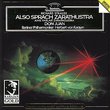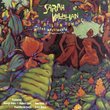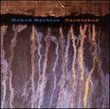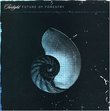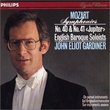| All Artists: Einojuhani Rautavaara, Leif Segerstam, Helsinki Philharmonic Orchestra Title: Rautavaara: Garden of Spaces; Clarinet Concerto; Cantus Arcticus Members Wishing: 1 Total Copies: 0 Label: Ondine Release Date: 5/24/2005 Genre: Classical Styles: Forms & Genres, Concertos, Instruments, Reeds & Winds, Symphonies Number of Discs: 1 SwapaCD Credits: 1 UPCs: 761195104125, 761195104125 |
Search - Einojuhani Rautavaara, Leif Segerstam, Helsinki Philharmonic Orchestra :: Rautavaara: Garden of Spaces; Clarinet Concerto; Cantus Arcticus
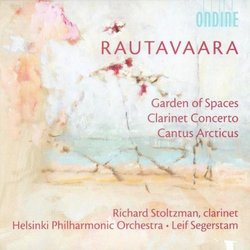 | Einojuhani Rautavaara, Leif Segerstam, Helsinki Philharmonic Orchestra Rautavaara: Garden of Spaces; Clarinet Concerto; Cantus Arcticus Genre: Classical
|
Larger Image |
CD DetailsSimilarly Requested CDs
|
CD ReviewsOne word: Gorgeous Russ | Richmond, VA | 08/11/2006 (5 out of 5 stars) "This music is stunning and the playing is fantastic! The music of the Finnish composer Einojuhani Rautavaara (b. 1928) is becoming relatively well known thanks in part to the enterprising Ondine and BIS labels. For those unfamiliar with Rautavaara, this disc makes an excellent introduction to this composer. This performance of the Cantus Arcticus - Concerto for Birds and Orchestra, Rautavaara's best known work, is the finest available. The orchestral playing is extremely clear and is perfectly balanced against the recorded birdsong, which itself is also very clear on the present recording. The birdsong accompaniment, consisting of the calls of larks, swans and other avian species, was recorded in Limuka, in northern Finland. In my opinion, the combination of recorded sounds with orchestral playing is seldom successful. This piece, however, might be the exception, as Rautavaara's writing is masterful and is never less than beautiful. In fact, this is probably the most beautiful piece of music composed in recent years. The soaring melodic lines and ethereal string texture perfectly compliment the birdsong. This is an amazing piece, which transports the listener to a different world, that is, unless the listener already happens to be sitting on the shores of a bog in northern Finland. The recording of this piece alone is worth the price of this disc. The Clarinet Concerto (premiered in 2001) is a recent work, and is immediately identifiable as Rautavaara. Similar to orchestral pieces which contain recorded sounds, concertos for the clarinet are usually not my favorite pieces of music, yet Rautavaara manages to compose a very beautiful and compelling work. The clarinetist, Richard Stoltzman, for whom the concerto was written, does an amazing job with the difficult solo part, which requires some of the highest clarinet playing I have heard (listen for what I believe is the world record high note 6 minutes into the first movement). The piece begins in a modern and spiky fashion, but the entrance of a noble horn theme changes the mood completely. From that point onward, the music is lyrical and haunting, with the personal style of Rautavaara is quite identifiable, evidencing itself through broad lyricism and swirling accompaniment that is evocative of the Northern landscape. The middle movement is based upon a long lyrical clarinet line, and is also quite lovely. The finale is almost playful, but is terser than the previous two movements. Like many modern works, the concerto ends somewhat ambiguously, with the clarinet in its highest register over pounding drums. The Garden of Spaces is very much within the same genre as the other two works. The orchestral writing is very atmospheric, yet dramatic and beautiful. As with the previous two pieces, the broad melodic lines over the wind-like swirling of the flutes and violins, is what identifies this music as being from the pen of Rautavaara. Although, this work is somewhat unique, as the different orchestral groups enter at the discretion of the conductor, with the order in which the different orchestral groups enter not specified. The result is that no one performance of this work will sound like another. Although, I was unable to pick up on this before reading the composer's notes, as the ending result sounds very purposeful. In summary, this is gorgeous. This release is also important, as it continues to make the case for Rautavaara, as one of the greatest composers of the modern era. If you give this music a chance, I am sure you won't be disappointed, I certainly wasn't. Get it. 59:08" A Clarinet concerto like NO other... bonerfly | NY | 11/20/2005 (5 out of 5 stars) "This is a Clarinet Concerto like NO other. A truly unique experience in music.Stoltzman (for whom it was written/with his input) is arguably the best Clarinetist on the Planet and in this concerto you WILL hear why. He coaxes both beautiful and other-worldly sounds from his instrument without ever really sounding atonal. this is, for the most part, a tonal piece of music and a GREAT one. Right on the edge as is rautavaara's style. And Stoltzman is ASTOUNDING. His various timbres and control are magnificent. I am a musician (a pretty good one too) and what he does here just simply makes my hair stand up and takes my breath away. Cantus Arcticus is here in the best version I have heard. The Helsinki Orchestra led by Rautavaara conductor extaordinaire, Leif Segerstam, give a Beautiful, graceful, virtuostic and definitive performance that just surrounds you and lifts you up to soar with the birds. As they also do during the entire CD. A main reason for this is the Sound...SPECTACULAR...Clean, clear,spacious with a wide dynamic range. Can't imagine recorded sound being much better than this. Reason alone to get this CD if you are a Rautavaara fan.." Jazz for the classical listener Erik C. Johnson | Indianapolis, Indiana United States | 11/17/2006 (5 out of 5 stars) "Garden of Spaces is very nice. Well-written, solidly-performed.
Cantus Articus is fine. Although this performance is as good as any -- and far better than the other two I've heard -- I'm just not sophisticated enough (maybe) to listen to the bird noises. They bug me. Just a personal issue, I know, but I can't handle it. But the Clarinet Concerto is out of this world. Truly. Personally, I feel this piece in a jazz sense. Don't get me wrong -- it doesn't swing or have cheesy blues riffs. Instead, if you've ever understood a really fine jazz performance, this recording will ring true. Stoltzman plays so fluidly and honestly he could be improvising. The orchestral structure is perfect -- complex, beautiful and exciting. Rautavaara manages to keep a tonal feel while stretching harmonies. Overall, it feels like the sophisticated version of Stan Getz's "Focus." If you are trying to convert a friend from jazz to classical, give them this work. Unreal." |

 Track Listings (7) - Disc #1
Track Listings (7) - Disc #1